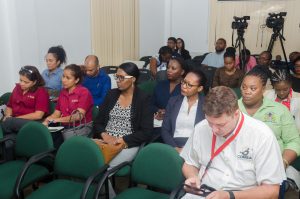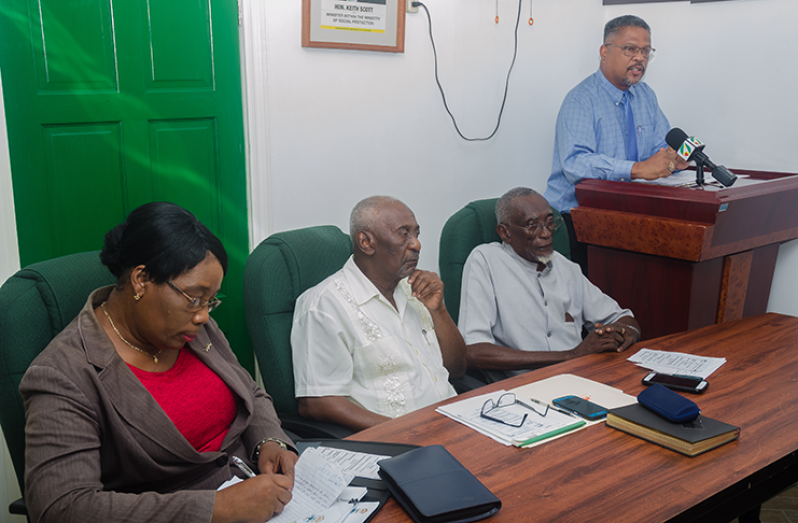RECOGNISING the need for foreign companies involved in employing persons in the oil and gas industry to understand the dynamics of employment and surrounding laws and policies in Guyana, the Department of Labour on Friday initiated consultations with several of the companies.
The DoL invited some 27 companies to the event. Attendees were briefed on matters such as work permits for foreign nationals, labour laws, occupational health and safety policies and laws, and recruitment.
“We recognise that the work ethos is changing. This government has a stable industrial climate and we hope you can get on board with that,” emphasised Minister of Labour, Keith Scott, as he addressed the representatives at the DoL Boardroom on Brickdam.
“The work in the oil industry is important to us so we have to ensure it is in compliance with all known labour practices. We have not invited you just to talk, but to establish a peaceful environment… establish practices in labour environment morale and fit within the framework of good governance.”
Scott noted that it is recognised that the Oil and Gas industry is changing the way recruitment is being done in Guyana, and the DoL is taking the necessary steps to adapt and ensure everything is still in keeping with the labour laws and that employees are protected.

“We are at a critical point in Guyana’s history [and] on the verge of new things happening and we have to prepare for those new things. You have brought here to us a new form of recruitment. Our history is mostly British style but we are more and more moving to the American recruitment and influence. There will be certain amounts of hiccups, but we are working on it,” Scott said.
Some of the international companies have been having some amount of difficulties interpreting what needs to be done in several areas in order to be compliant.
Head of Immigration and Support Services, Carol Lewis-Primo, spoke extensively on the necessary steps the employers need to take in applying for work permits for foreign nationals. An issue being faced is employers applying for work permits after the foreign national has entered Guyana.
“If there is no approval on arrival, the foreign nationals will be landed as visitors, and [that is] not compatible with what they are here for. When you then apply for approval they have to leave the country and return to be landed as an employment possible person,” Lewis-Primo explained.
She clarified that the employers need to apply for the permit prior to the employee arriving, as the employee, upon arriving in the country, needs to be stamped in by immigration officers, as being registered to work, not while in the country.
This applies both to whether or not the foreign national requires a visa to enter Guyana. The work permits will last for a period of two years, and the foreign national can travel in and out of the country multiple times during that period without needing to renew.
The necessary permits can also be applied for the spouse and children of the working foreign national. The children will be given three-year student visas allowing them to attend school.
Lewis-Primo warned that employers need not wait until last minute as it comes down to the work permits’ expiration date. It takes approximately one month for the Department of Citizenship to have the application processed, given the increase in applications currently being handled.
“Don’t wait until you have just a month before the visa expires. We have [an] uptick in applications, it is overwhelming. We are asking if you can submit the application at least six weeks in advance so that we can complete our work and you can have the application within that time. There are cases where we go way beyond the month – sometimes we cannot avoid that. Yes you will have emergencies at times and we cater for that. All you have to do is inform us and we will assist despite our work load,” Lewis-Primo explained.
Legal Officer at the DoL, Kimbely Yearwood, gave some clarity to the parameters of what determined whether a person can be considered an employee or a self-employed contractor. She noted that employers would attempt to bypass labour commitments by labelling employees as independent contractors, when the individual could be covered as an employee and be entitled to all rights therein.
Yearwood explained that the law explicitly instructs employers in determining how a worker is categorised, and this supersedes any existing contract between the employer and worker.
“Law of employment is very extensive, it goes deeper than society acknowledges or understands. There are instances where a worker is described as independent contractor but when you carefully examine the true nature of the relationship, the worker is an employee disguised as independent contractor. Employers do this because they want to escape the law,” Yearwood noted.
“The approach to determining employment status is to adopt a multifaceted test. For a worker to be considered employee there must be obligation on the part of the employer to provide work and worker to do work when offered. If an employer can decline work or the employee can decline to do work, no contract or employ exist.”
An address on occupational health and safety (OHS) was delivered by OSH Consultant, Gwenneth King. Industrial Relations Consultant, Francis Carryl, pointed out that oil rigs are considered floating factories, and workers are not considered sailors on a ship, and therefore come under the necessary safety measures expected of a factory.
King noted the need for a revision of the penalties contained within the OSH Act as a bigger deterrent for employers to flout safety laws.
“We have started the process of reviewing and revising the act,” King noted.
The attendees also heard remarks from Chief Labour Officer, Charles Ogle; Chief Recruitment and Manpower Officer, Valerie Moore; and Chief Statistical Officer, Saskia Eastman.



.jpg)









